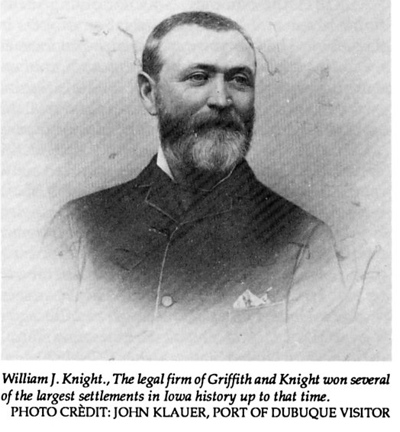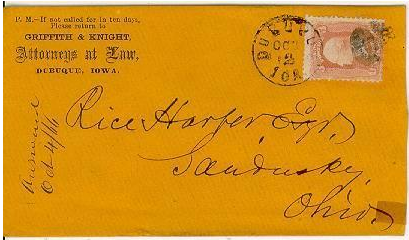Encyclopedia Dubuque
"Encyclopedia Dubuque is the online authority for all things Dubuque, written by the people who know the city best.”
Marshall Cohen—researcher and producer, CNN
Affiliated with the Local History Network of the State Historical Society of Iowa, and the Iowa Museum Association.
KNIGHT, William J.: Difference between revisions
No edit summary |
No edit summary |
||
| (9 intermediate revisions by the same user not shown) | |||
| Line 1: | Line 1: | ||
[[Image:imp209.jpg|left|thumb|350px|]]KNIGHT, William J. (Kilkenny, Ireland, Mar. 3, 1838-Dubuque, IA, Feb. 23, 1908). [[MAYOR]]. Knight, partner in the law firm of Griffith and Knight, was one of the first attorneys to establish a practice in Dubuque. Knight studied law in the office of [[GRIFFITH, Jeffrey M.|Jeffrey M. GRIFFITH]] during the years 1855 and 1856. In 1857 after successfully passing the bar examination at the age of nineteen, Knight joined his former teacher as a partner. | [[Image:imp209.jpg|left|thumb|350px|]]KNIGHT, William J. (Kilkenny, Ireland, Mar. 3, 1838--Dubuque, IA, Feb. 23, 1908). [[MAYOR]]. Knight, partner in the law firm of Griffith and Knight, was one of the first attorneys to establish a practice in Dubuque. Knight studied law in the office of [[GRIFFITH, Jeffrey M.|Jeffrey M. GRIFFITH]] during the years 1855 and 1856. In 1857 after successfully passing the bar examination at the age of nineteen, Knight joined his former teacher as a partner. (1) | ||
During his legal career, Knight participated in several of the most significant cases of his time. The case of Dubuque Elevator Company vs | During his legal career, Knight participated in several of the most significant cases of his time. The case of Dubuque Elevator Company vs [[ILLINOIS CENTRAL RAILROAD]] involved a claim of $400,000.00 and resulted in the largest legal fee ever paid to that date. As a result of that case, the Illinois Central hired the firm of Griffith & Knight as their attorneys. (2) | ||
He was elected to the board of education in 1867 and in 1869 Knight was elected to his first of three terms as mayor. It was during his administration that the council granted a franchise to the water company and he was the author of the important clause that gave the city the right to purchase the entire system. While mayor in 1872, Knight was one of three attorneys appointed by the state legislature to the Code Commission assigned the task of codifying the criminal laws of Iowa. (2) | |||
In 1878 as mayor he established a committee of five councilmen and three citizens to travel to Council Bluffs to observe what that city had done to establish a bridge across the Missouri River. (3) He was criticized by some residents for the amount of money spent in 1879 on street construction. Knight replied as he left office that the question had been whether to hire the local labor or leave them unemployed when no other work was available. (4) As he stated: | |||
in | |||
the | |||
Capitalists, men of means, never more completely stand | |||
in their own light; never more antagonize their own | |||
interests, than when they oppose, find fault with, or | |||
object to a judicious expenditure of public funds to | |||
employ the unemployed. (5) | |||
Knight ran successfully for the Iowa Legislature in 1880 and was elected to his first of two terms in the state senate in 1885. Knight also served as the legal representative of the [[SISTERS OF CHARITY OF THE BLESSED VIRGIN MARY (BVM)]] assisting them with property acquisition and management. (6) | |||
Knight | |||
[[Image:knight.png|right|thumb|350px|]] | [[Image:knight.png|right|thumb|350px|]] | ||
-- | -- | ||
| Line 38: | Line 19: | ||
Source: | Source: | ||
Oldt, Franklin T. ''History of Dubuque County'' | 1. Oldt, Franklin T. '''History of Dubuque County, Iowa'''. Chicago: Western Historical Company, 1880, p. 824 | ||
2. "Prominent People," ''Dubuque Daily Herald'', February 19, 1893, p. 5 | |||
3. "The Ferry Over the Bridge," ''Dubuque Herald'', April 12, 1878, p. 4. Online: https://news.google.com/newspapers?nid=uh8FjILnQOkC&dat=18780412&printsec=frontpage&hl=en | |||
4. "Old and New," ''Dubuque Herald'', April 11, 1879, p. 4. Online: https://news.google.com/newspapers?nid=uh8FjILnQOkC&dat=18790411&printsec=frontpage&hl=en | |||
5. Ibid. | |||
6. Riley, Rachel Katherine Daack. '''BVM Catholic Schools and Teachers: A Nineteenth-century U.S. School System'''. Proquest, 2008, p. 64 | |||
Oldt, Franklin T. '''History of Dubuque County, Iowa'''. Chicago: Western Historical Company, 1880 | |||
[[Category:Politician]] | [[Category:Politician]] | ||
[[Category: Lawyers and Judges]] | [[Category: Lawyers and Judges]] | ||
Latest revision as of 01:40, 20 June 2019
KNIGHT, William J. (Kilkenny, Ireland, Mar. 3, 1838--Dubuque, IA, Feb. 23, 1908). MAYOR. Knight, partner in the law firm of Griffith and Knight, was one of the first attorneys to establish a practice in Dubuque. Knight studied law in the office of Jeffrey M. GRIFFITH during the years 1855 and 1856. In 1857 after successfully passing the bar examination at the age of nineteen, Knight joined his former teacher as a partner. (1)
During his legal career, Knight participated in several of the most significant cases of his time. The case of Dubuque Elevator Company vs ILLINOIS CENTRAL RAILROAD involved a claim of $400,000.00 and resulted in the largest legal fee ever paid to that date. As a result of that case, the Illinois Central hired the firm of Griffith & Knight as their attorneys. (2)
He was elected to the board of education in 1867 and in 1869 Knight was elected to his first of three terms as mayor. It was during his administration that the council granted a franchise to the water company and he was the author of the important clause that gave the city the right to purchase the entire system. While mayor in 1872, Knight was one of three attorneys appointed by the state legislature to the Code Commission assigned the task of codifying the criminal laws of Iowa. (2)
In 1878 as mayor he established a committee of five councilmen and three citizens to travel to Council Bluffs to observe what that city had done to establish a bridge across the Missouri River. (3) He was criticized by some residents for the amount of money spent in 1879 on street construction. Knight replied as he left office that the question had been whether to hire the local labor or leave them unemployed when no other work was available. (4) As he stated:
Capitalists, men of means, never more completely stand
in their own light; never more antagonize their own
interests, than when they oppose, find fault with, or
object to a judicious expenditure of public funds to
employ the unemployed. (5)
Knight ran successfully for the Iowa Legislature in 1880 and was elected to his first of two terms in the state senate in 1885. Knight also served as the legal representative of the SISTERS OF CHARITY OF THE BLESSED VIRGIN MARY (BVM) assisting them with property acquisition and management. (6)
--
Source:
1. Oldt, Franklin T. History of Dubuque County, Iowa. Chicago: Western Historical Company, 1880, p. 824
2. "Prominent People," Dubuque Daily Herald, February 19, 1893, p. 5
3. "The Ferry Over the Bridge," Dubuque Herald, April 12, 1878, p. 4. Online: https://news.google.com/newspapers?nid=uh8FjILnQOkC&dat=18780412&printsec=frontpage&hl=en
4. "Old and New," Dubuque Herald, April 11, 1879, p. 4. Online: https://news.google.com/newspapers?nid=uh8FjILnQOkC&dat=18790411&printsec=frontpage&hl=en
5. Ibid.
6. Riley, Rachel Katherine Daack. BVM Catholic Schools and Teachers: A Nineteenth-century U.S. School System. Proquest, 2008, p. 64
Oldt, Franklin T. History of Dubuque County, Iowa. Chicago: Western Historical Company, 1880



